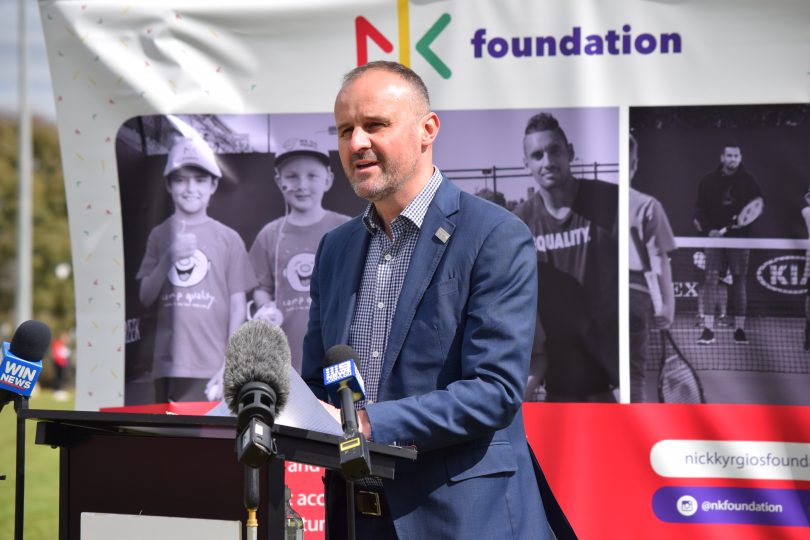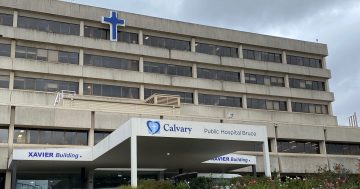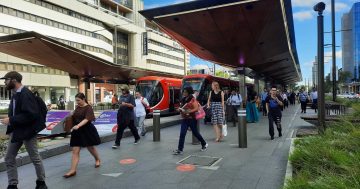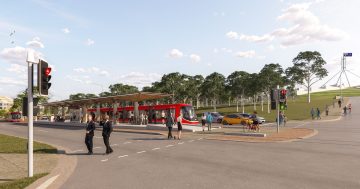
ACT Chief Minister Andrew Barr pledging to build a new tennis facility at Gungahlin. Photo: Tennis ACT.
Andrew Barr faces the forthcoming ACT election with both anticipation and a mild degree of frustration.
Anticipation because he’s confident of having led the ACT through the pandemic with the economy relatively intact. Frustration because he thinks some of his government’s achievements are insufficiently appreciated.
This time around (unlike 2016) there’s no meaningful talk of his departure. National Cabinet appears to have solidified his leadership credentials and left him feeling comfortable in his own skin, despite repeated opposition lines about an “old and tired government”.
ACT Election: Chief Minister Andrew Barr outlines his vision for Canberra
How are you deciding who to vote for? Region Media is interviewing the leaders of the Assembly's three key parties on their vision for Canberra. First to speak with Genevieve Jacobs is Labor's Andrew Barr on the economy, incumbency and experience.
Posted by The RiotACT on Monday, September 21, 2020
He believes that solid wins will define his government’s term. Take, for example, health.
Despite opposition to the Garran COVID-19 pop-up, Mr Barr remains adamant it was the right call. He rejects the suggestion that there’s been too little emphasis on hospital beds and too much on walk-in centres pointing to $750 million in hospital investment.
“There’s not enough recognition that we built the University of Canberra Public Hospital last term and that’s taken a degree of pressure off both the Canberra Hospital and Calvary. That’s freed up space and allowed an expansion of services,” he says.
He ticks off the Calvary Hospital emergency expansion, a successful tenderer for the Canberra Hospital expansion and the Centenary Hospital for Women and Children expansion project. But Mr Barr says the 70,000 walk-in patients who would otherwise have rolled up to emergency wards are the best retort to those who say that waiting times are still too long and performance too poor.
“On the supply side you need to build bigger emergency departments and have more beds but you need to address demand too, otherwise, the interaction of the two is longer waiting times,” Mr Barr says.
“The solution is not only expanding hospitals but keeping people out of there in the first place.”
Light rail is also no longer a key issue. Last year the Liberals conceded it would go ahead if they were elected although question marks hover over the route and timing. Any suggestion the project could be temporarily halted has met with sharp criticism from the construction industry which says that would have a devastating effect on the economy.
Mr Barr says the government has accumulated considerable expertise after building the first major piece of comparable infrastructure since the old Queanbeyan rail line. Certainly, the pandemic has stalled some progress and there are five different approval requirements for Stage 2A, ranging from the NCA to Commonwealth environmental permissions. But there is no going back now.
“We have taken the view that we can’t put the contract out to tender without those planning approvals in place. The private sector wouldn’t take on the risk and costs if there were delays.
“If the Liberals thought they could get some mileage out of light rail, they would be doing it,” he says. “They don’t want to do it, they have no enthusiasm for it but they feel they can’t oppose it.”
Mr Barr is also dismissive of the Liberals’ proposed ‘Stanhope poverty taskforce’, characterising the response from the sector as “an eyeroll – not another poverty taskforce when we already know what we need”.
He says a major hurdle has been overcome with the changes to JobSeeker payments, but argues that the ACT’s most vulnerable are better served with targeted concessions rather than a broad-based rates freeze that limits the ACT’s revenues.
“I don’t need the rate freeze. The fact that the rate burden falls on the top 20 per cent more than previously is mostly evidence of a more progressive taxation system.
“If you are going to spend more on reducing costs, do it for the cohort for whom it makes a meaningful difference. You don’t need to give tax cuts to rich people.”
Longer-term, he’s planning for a pandemic response that rolls on for some time yet. Public health measures aside, a Barr government expects that rebuilding will mean a prolonged transition period while we await an effective vaccine.
He’s confident there is a way forward for the economy as a whole, even for the arts, entertainment, tourism and hospitality sectors. Industries that are less labour intensive are already, he believes, rebounding well.
“Interestingly, now Canberrans are saving more, on average one-in-five dollars. Eventually, that will be spent. There will be a pent up demand for arts, culture, travel and the like. That’s the good news: when it’s safe there will be demand and we’ll be ready.”
But is the ACT ready for 23 years of the same government? Only the voters can decide.





















